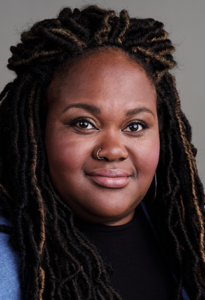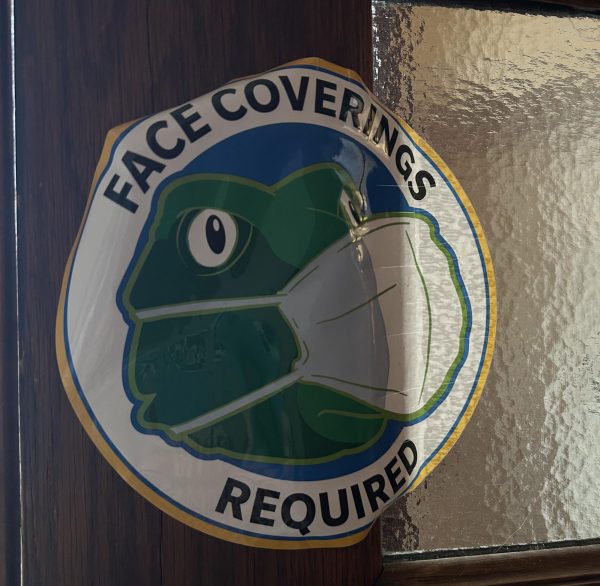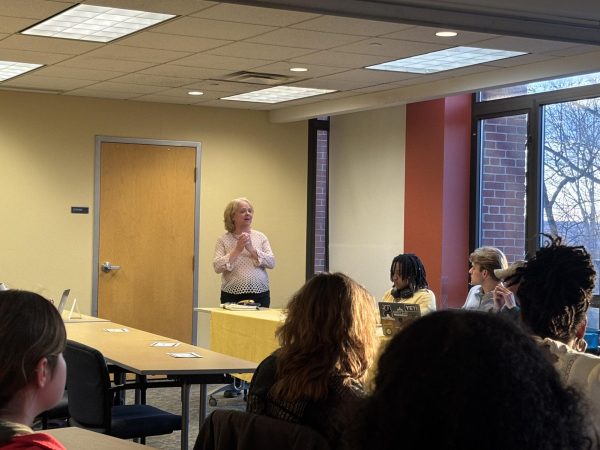Dukes to leave in May for Chatham University
Dean for Institutional Advancement Kristin Dukes will be taking a new position as Vice President of Diversity, Equity and Inclusion at Chatham University.
President Hilary Link announced the change via email on Monday, April 18. Dukes, who will remain at Allegheny through May 15, leaves behind a radically transformed Office of Diversity, Equity and Inclusion from the one she joined in July of 2018.
“When I arrived at Allegheny, I initially reported to (Provost and Dean of the College Ron Cole, ’87), so my position was in a different space, if you will, but it still had the institution-wide focus,” Dukes said. “Under (Link), the position was elevated to reporting directly to the president and took on a more expanded focus, with some explicit pieces focusing on diversity, equity, inclusion, (and) professional development opportunities for all of our employees. Anything that has to do with assessing campus climate and culture around diversity, equity, and inclusion comes through my office.”
The ODEI portfolio is broad in scope. As Dean for Institutional Diversity, Dukes co-chairs the Council on Diversity and Equity, which looks at data from Human Resources, Public Safety, Student Life, Enrollment, Admissions and other college units to make policy recommendations to governing bodies like the Board of Trustees.
Dukes also oversees the administration of the Diversity and Equity Campus Climate Survey, a tool developed by the Higher Education Data Sharing Consortium. HEDS describes the survey a way for institutions to “develop a better understanding of the extent to which their campus climate supports diversity and equity, and to inform and improve support, policies, and practices at their institution related to diversity and equity, including those to prevent or respond to discrimination and harassment.”
The data from the survey helps inform ODEI’s work, which is realized in student-oriented projects like the Inclusion, Diversity, Equity, Awareness and Social Justice Center and college hiring policies like the Faculty Cohort program, which is designed to diversify faculty recruitment through a “wraparound mentorship program.”
“They have peer mentors, they have disciplinary mentors that focus on their teaching and their scholarship, (and) they have an institutional mentor who helps them understand the landscape of higher education for people with marginalized and minoritized identities,” Dukes said. “There is also a membership to an external resource called the National Center for Faculty Development and Diversity that any faculty member within the cohort program also gets an annual membership to, which is an additional resource for them as both recruitment and retention strategy for (Black, Indiginous and people of color) faculty.”
Both the Faculty Cohort program and the Diversity Teaching Fellowship — a two-year postdoctoral position designed to support the careers of BIPOC professors across higher education — are now managed by Assistant Professor of Community and Justice Studies Heather Moore Roberson, who serves as the point person for ODEI’s faculty work in addition to teaching classes. In October of last year, the ODEI team also expanded with the hiring of Tevis Bryant as assistant dean for institutional diversity.
“That particular position … was created specifically to look at employee diversity, equity and inclusion opportunities,” Dukes said. “We did not have anyone or any position devoted to doing that type of work until last October when (Bryant) came on board. That position also serves as a community liaison, working with the local Meadville community on issues of diversity, equity and inclusion.”
However, that position is now vacant; Bryant stepped into the role of Vice President and Dean of Students following April Thompson’s resignation from the post in late February. This shift — and the vacancy it created in ODEI — stands among others in college policy that reflect a changing institution. Since Dukes joined Allegheny, the college has hired a new president, developed an Office of Class Deans, reworked the Learning Commons into the Maytum Center for Student Success, and reconfigured the college’s academic offerings.
“Over the past four years, the last two in particular, Allegheny has experienced a number of what I call, ‘growing pains,’” Dukes said. “But there is light at the end of the tunnel. I’ve worked with people here — students, faculty, staff, senior administrators — that are deeply devoted to diversity, equity and inclusion and want to keep the momentum going … I think with President Link’s strategic priority of inclusive excellence and holistic student success — having those priorities very clear, folks will be able to fall in line behind (those priorities) and get some good work going.”
Chatham University is a school of around 2,200 students in Pittsburgh, and while it has a diversity council and a diversity, equity and inclusion plan, Dukes has been hired to help to implement that plan.
“Chatham is in a similar position to what Allegheny was in when I first moved in, in that there was kind of an office (of diversity, equity and inclusion) but not necessarily the infrastructure built out,” Dukes said. “I think that what Chatham found attractive about me is the ability to look at an institution, figure out where its weaknesses and areas of opportunity are, and try to build out the infrastructure to make that happen.”
Before coming to Allegheny, Dukes taught psychology at Simmons University in Boston, and by 2017 had been granted tenure. However, a variety of personal and private matters led Dukes to look back to the job market.
“The extra push came from one of my mentors, who had said to me, ‘you try to find what you can to develop professionally where you are, and if you can’t find those resources, then it’s time to move on,’” Dukes said. “So I spent some time trying to find the resources to get more training and more development in the DEI space, and at (Simmons) there was just no more room for that type of advancement.”
Five years later, Dukes said that changes in her personal life — though this time not her professional considerations — had again caused her to pause and reflect on where she’s going in life.
“I recently had a baby; my daughter is now five and a half months old,” Dukes said. “It was one of those moments in life where I paused and said, ‘okay, am I doing everything that I want to do professionally? Are there ways in which I could stretch and challenge myself more? What does that mean for my family? What does that mean for my child?’ That is when I started to see opportunities for senior diversity officer positions or chief diversity officer positions at other institutions. Many of them were vice president positions, so I threw my hat into the ring … Chatham was one of those institutions that offered me a position and I accepted.”
As Dukes departs, she sees Allegheny as heading in the right direction. She said she was excited about the work of IDEAS Center, saying that Director Darnell Tucker and Program Manager Mikka Hunt have “an amazing vibe.”
“I know that change never happens as fast as people would want, but we’re getting there,” Dukes said. “When I got here, (ODEI) was a single office of one individual reporting to the provost. And what we have now is elevated to the president’s cabinet in an explicit way. There is now a diversity, equity and inclusion committee of the Board (of Trustees) that did not exist when I got here. There is the opportunity for so much good work going forward.”

Sami Mirza is a senior from many different places. He is majoring in International Studies with a focus on the Middle East and North Africa and minor in...









